An impassioned, extremely well-made film with a sincere emotional current (i.e., one that actually makes you feel something with an application of professional finesse rather than hokey button-pushing) opens after being acclaimed by critics or film festival audiences or both…and what happens?
The public doesn’t respond with much enthusiasm. The movie opens in third or fourth or fifth place, or it opens okay but not as strongly as it should have, and then it’s dead by the second or third weekend, if not sooner.
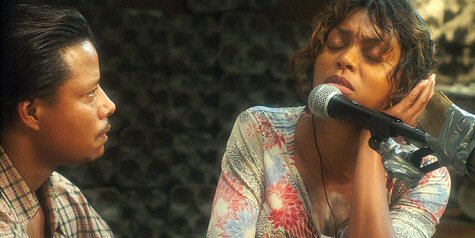
Terrence Howard, Taraji P. Henson in Craig Brewer’s Hustle & Flow
And then journos start thinking twice about putting this or that insufficiently-loved film on their best-of-the-year lists because they don’t want their editors to think they’re out of touch or living in their own realm.
All because the marketing wasn’t handled in exactly the right way…or the market- ing was fairly on the money and the paying public still didn’t care that much and went to see…whatever….Saw II, Flightplan, The Legend of Zorro, Wallace and Gromit, The 40 Year-Old Virgin, etc.
I’m not talking about a disconnect between effete critics loving the latest downer- head, hard-to-stay-with, impossible-to-really-like art film, and audiences doing their usual avoidance-rejection of anything that doesn’t deliver a rousing visual punch, or that isn’t arresting on some primitive horrific-comedic level.
I’m talking about fairly high-grade, non-elitist, feel-good movies getting the cold shoulder, or at least they’re not getting the love they deserve. Why? I could theorize but I’d wind up sounding like a misanthrope.
I don’t have a long list of examples, but 2005 has availed itself of a few modest calamities in this vein.
The two most obvious are Craig Brewer‘s Hustle & Flow ($22 million so far), a movie with some euphoric musical-high scenes and a fully-earned righteous-uplift finale, and Curtis Hanson’s In Her Shoes, a movie with a $70 or $80 million quality aura that’s taken in only $30 million so far. I’ve written enough about this film, but it qualifies.

Beautiful Country director Hans Petter Moland, Damien Nguyen during filming
I don’t care if anyone agrees with me, but Hans Petter Moland’s The Beautiful Country delivered in the general realm I’m describing — it’s a heart movie with a carefully rendered tone — and it was all but ignored.
I’m a bit worried that Thomas Bezucha‘s The Family Stone, a smart, sophisticated family-friendly comedy, might underperform or fail to reach an appropriate-sized audience…partly because it’s opening relatively late in the holidays (12.16) and will lose a bit of its appeal after January 1, 2006. And partly because rural-sector audiences might say, ‘Is this dopey enough? Are these people like the people in my family or…?’
I’m afraid Fox marketing might have erred in abandoning the original early Novem- ber release, and that audiences might be smelling this indecision and starting to go ‘hmmm.’
I’ve mentioned this before, but I’m wondering more and more how much ticket- buying support Ang Lee‘s Brokeback Mountain — easily one of the most emotionally affecting mainstream films I’ve seen this year — will be getting. I’m not predicting anything, but if it gets cold-shouldered…maybe I shouldn’t bring this up.
Quality movies obviously do well (or fairly well) from time to time, or at least man- age to avoid box-office humiliations. The $28 million earned so far by A History of Violence isn’t bad, given what it is. The Constant Gardener‘s nearly $33 million domestic gross is a moderately satisfying thing…depending on your attitude. Intriguing cultivated-audience films all seem to top out in the high 20s or low 30s.
We all know about disparate movie appetites making a world. There are Saw II fans vs. fools for Capote. It’s not a crime to like primitive boilerplate films which (here comes a troublesome statement) are primarily made for people who lead straight-from-the-shoulder, not-deeply-examined, Carl’s-Jr.-salad-bar lives, and there are films for those with somewhat more developed interiors…folks who’ve gone to college, grown up a bit, read a few books.
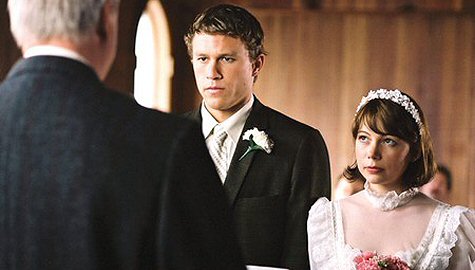
Heath Ledger, Michelle Williams in Brokeback Mountain
What staggers me is when the instinctuals, who obviously comprise the majority, blow off films that are relative no-brainers and are also emotionally shrewd and affecting.
I’ve always presumed people of all stripes and persuasions go to movies mainly to feel something profound…to connect with this or that lump-in-the-throat emotion that they’re not experiencing all that much in their day-to-day lives…but maybe not.
I know that Dylan, my extremely bright (i.e., smarter than me) 15 year-old son, doesn’t care at all for lump-in-the-throat movies. He’s partial to intensely visual movies, naturally, and stays away from anything that smells square or schmaltzy.
Shruggers
Movie reviews always seems to lean in the direction of “thumbs up” or “thumbs down.” But what about those relatively engaging, not-that-bad ‘tweeners?
I’ve seen a lot of films that I can’t really rave about, but I’ve had a moderately okay time with. Didn’t hate ’em, didn’t love ’em…they left me not hungry, not angry…and maybe a little more than half satisfied.
I’ve always thought Ebert and Roeper should add a “thumbs sideways” rating. Thumbs sideways would mean “wait for the DVD,” I know…and if I were paying to see movies, that’s how I’d process this reaction.

But thumbs sideways is better than thumbs down, and any honest critic will tell you that many, many films (roughly 15% or 20%) are not profound works of art or deliriously entertaining, but a long way from being pieces of shit.
Recent shruggers include North Country, Lord of War, Junebug, The War Within, Dreamer: Based on a True Story, Proof, Thumbsucker, Everything is Illiminated, New York Doll, The Libertine, Ellie Parker, The Untold Story of Emmett Louis Till, 2046 and Kings and Queen.
They’re not bad, they don’t stink, I didn’t hate them and I didn’t walk out in a bad mood. What do you want from a film…perfection and purity?
Tuesday Grabs
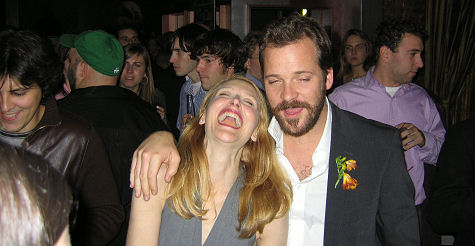
Dying Gaul costars Patricia Clarkson, Peter Sarsgaard at Kanvas (9th Avenue and 23rd Steet), site of the post-premiere party — Tuesday, 11.3.05, 10:15 pm.
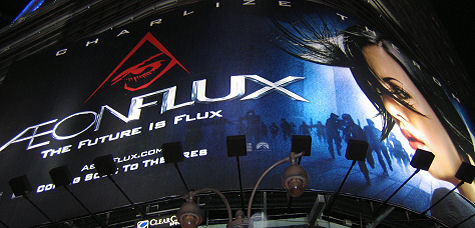
Billboard at corner of 42nd and 7th Ave. — Tuesday, 11.3.05, 10:40 pm.

Wednesday, 11.4.05, 7:05 am.

Approaching Times Square from 40th Street — Tuesday, 11.3.05, 10:40 pm.

Cop cars assembled to handle some sort of security issue regarding New York City visit of Prince Charles and Camilla Parker Bowles…I think.

Peeking at Diane Sawyer through the big window outside Good Morning America studios at B’way and 44th — Wednesday, 11.4.05, 6:55 am.

Spiritual Sell
Gotta love that Bob Berney marketing audacity. Lay it on the line, sell the movie you have and damn the torpedoes.
I’m referring to Berney’s decision to call a certain heart-warming, Israeli-produced film, which his company, Picturehouse Films, picked up for U.S. distribution a few months ago…a movie that, let’s be honest, very few people other than Orthodox Jews in New York and Florida will want to see no matter what it’s called…a movie that Berney, in his admirably mule-stubborn way, has decided to sell with its orig- inal title, which is…ready?…Ushpizin.
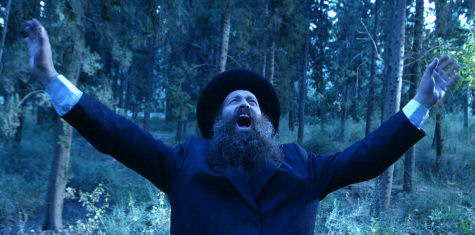
Shuli Rand, star and screenwriter of Ushpizin, enduring a moment of anti-rapture
I would have called it Holy Guests or Bad Company or something like that. Partly because the movie’s about a Jewish Orthodox couple playing host to a couple of ne’er-do-wells during a holiday, but mainly because these titles are more…goy- friendly?
But then I’m not Bob Berney. I’m just this guy typing away inside a modest Brooklyn apartment while Berney sits in regal poobah splendor inside his $17 million Park Avenue triplex, tabulating profits from his offshore investments and making and breaking careers with a slight raising or lowering of his eyebrows…a much-feared and much-envied “big op” renowned for great wisdom and shrewd business judgment.
Okay, I’m kidding about the triplex and the eyebrows and the offshore investments, but Berney is a smart distributor so maybe he made the right call.
Let’s start with the Ushpizin basics, beginning with the correct pronunciation, which is oosh-peh-zeen.
Directed by Giddi Dar and written by the film’s star, Shuli Rand, Ushizpizin is about a poor Orthodox Jew named Moshe who lives in Jerusalem with his wife Malli and is trying to live by the spirit of the festival of Sukkot…I’m sorry, is this sounding too exotic already?

Moshe’s a nice pudgy middle-aged guy with a long squiggly beard, but he and his chubby wife Malli have no kids and he’s feeling a little bit blue about this and other matters.
And then these two jerky oddballs show up — Eliyahu, an old pal of Moishe’s from his pre-Orthodox, running-around days, and a pal called Yossef. They’re prison convicts on the run from the law, which eventually becomes known by Moshe and Malli, and from this complications ensue.
As with all spiritual fables, the visit by this unruly pair turns out to be a kind of blessing in disguise.
There’s a totally valid analogy between Ushpizin and David Cronenberg’s A History of Violence. You could also say it parallels Michael Mann’s Collateral, which is also about redemption arriving in the form of criminal behavior.
L.A. Daily News critic Bob Strauss, who doesn’t roll over for just anything, has called Ushpizin “one of the best character-based comedies of the year.”
Ushpizin has already played successfully in Israel for about a year. It just opened limited on Friday, 10.28, and is expanding on 11.4 to Philadelphia, Boston, Los Angeles and (I think I have this right) Florida. Basically anywhere there’s a heavy Jewish Orthodox population,okay?
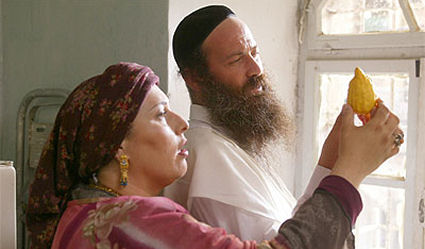
Dar said that even in Israel he was told by distributors to change the title because “a lot of [Israelis] don’t know what it means.” (It means “guests” or “holy guests.”) But when he spoke to Berney about selling the film in the U.S., Berney said “let’s trust in God and keep it…let audiences break their teeth.”
Berney decided to stick with Ushpizin precisely “because it’s exotic. I just thought it made more sense to go with the original Hebrew name.”
Berney acknowledges that the interest in “small outside of New York City, but inside New York City it’s huge. We’re going to take it slowly, obviously playing to the core audience first….evangelicals, other faiths…it’s a film, after all, about belief and a test of faith. And there’s also the arthouse crowd.”
Berney and his wife Jeannie went to a screening of Ushpizin last week at a Brooklyn neighborhood called Borough Park.
“It’s a Hassidic, ultra-Orthodox neighborhood near Coney Island, and it’s really it’s own world. A very concentrated, ultra-Orthodox Hassidic community. It was at a high school auditorium and there were hundreds of people and many of them were coming up to me and telling me they were really pleased…it was mainly a 35 or 40 year-old crowd.”
Gadar agrees that the word “exotic” applies to the title of Ushpizin as well as the film itself, “but the interesting part is that when you cross the line and look at the world from Moshe and Malli’s point of view…you end up finding they’re very much like you.

Official Ushpizin T-shirt, available through official website.
Gadar says he’s “not religious at all” but says, “I think what this movie offers is that it’s a completely authentic movie about faith…teling a story which all faiths and cultures can identify with.”
When Ushpizin played in Isarel last year “everybody …secular, liberals, left- wing…saw it.” America is the first country outside of Israel to have theatrical playdates,he tells me.
“I showed the film to some Muslim people, but I don’t think Muslim countires will allow it to be played in their territories. I would like to show it in Iran…but it’s not that simple to put an Israeli film in Ian or even Egypt. It’s very hard. But the best thing about this movie is that it overcomes politics.”
And the best thing for Berney and Picturehouse Films, obviously, would be for Ushpizin to catch on with the goyim.
Honestly? I might not have gone to see this film if I hadn’t been given a screener. The title seems to be a statement that it isn’t for someone like me. But having seen it, I can say that it’s a film I respect for its heart and spiritual values, and that I feel a certain allegiance because of this.
Jarhead Support
“I haven’t seen Jarhead, but I read Anthony Swofford’s book while on my year-long tour in Iraq last year. And now that I’ve just read your commentary on the film, it appears that the filmmakers have actually tried to make a film that is honest about modern war, if not battle.
“I don’t yet know if that’s necessarily a problem, but an issue that I have with most war movies (now that I’m a ‘war’ veteran), is that they aren’t war films. Battles are exciting but war is boring. You also have to realize that except for the first wave of fighting in Faluha, there haven’t been pitched conflicts during the Iraqi occupation.

Jarhead costars Jake Gyllenhaal, Peter Sarsgaard
“Even those soldiers unlucky enough to have been under direct fire will tell you that 99% of their time is spent being bored out of their minds. So if you want to tap into the reality of a soldier (most of whom are not traditional triggermen, but support soldiers) you have to address the boredom and personal demons that soldiers focus on in the absence of anything to do. I mean, I too went batty about a girl back home.
“I was trained for three years and then I spent 10 months with a higher headquarters staff, where I stared at a computer screen for 12 hours a night, 7 nights a week, so I can really relate to the frustration that comes with not doing the job that you volunteered for and trained to do. It makes that time feel like it’s been stolen from you.
“I guess my point is that what Jarhead is about is what those who experience it feel about the boredom factor that is part of the totality of fighting a war. Non-veterans, it seems, don’t want to tap into that truth, and seem to prefer ideas of being entertained by their concepts of what war (or war movies) ought to be like.” — Andre Rember, formerly a Captain in the U.S. Army Artillery.
“I haven’t seen Jarhead, but your piece said there’s no story or plot and that’s upsetting (a little), but the waiting and many of your other descriptions sound exactly what life is like in the military.
“What your wrote actually makes it more intriguing to me now. How you described the movie is our reality. That is exactly what it is like. Train, train train…get ready, get ready…wait…okay, something happened so you’re not going now. (A constant emotion and adrenaline roller-coaster)

“That is enlisted life. I am wrapping up my fifth year in the military and although I haven’t been to the desert, your descriptions are dead on as to what it is like most of the time.
“Does that make Jarhead a good movie? Maybe not, especially for those outside of the military. But at least it sounds real. It could do well with military, depending on ‘if they get it.’ (Most of my military counterparts are more interested in Saw II) Many could come out saying, ‘Yep that is what it’s like.’ And tell their friends. But that won’t create a huge box office or push any awards.” — A senior Airman who asked for anonymity
“I disagree that Jarhead fails ‘to stir any primal chords about anything …to make anyone feel anything about what happened 14 years ag,’ as you said. It must be that I served my time in the Army and had those same feelings of anticipation, anxiety, fear, and regret.
“And I really didn’t see those things in Gunner Palace (which isn’t to say I didn’t like it and it didn’t hit close to home). Hell, Nick Moncrief (the Sgt. who raps in that movie) was in my Basic Training platoon at Ft Sill. To this day I have several family and friends over there and it’s a damn crime.
“That said, Jarhead does something that no other war’ film has done — it paints the portrait of what it is to be a soldier in a way that spooked me.
“When Peter Sarsgaard’s character announces to his buddies after seeing a newscast that ‘we are going to war,’ almost made me throw up with memories of the morning of Sept 11th and when the same reaction happened from my line NCO.

“Everything that follows is a pitch-perfect portrayal of the hurry-up-and-wait mentality of the U.S. armed forces. Jarhead is what it is to be a modern soldier. What you infer is that all of the little things about Jodie and other common military horror stories, is they are simply cliches. Well, they are real — this is what happens. Every soldier knows them and every soldier has expierenced them or knows someone who has.
“As far as the message of the film is concerned, Mendes & Co. simply were showing how dissapointing the whole ordeal was. Every thing from the tagline to the looks on the Marine’s faces when the Vietnam Vet enters their bus…it was all a disappointment.
“That scene is another (of many) that hit home way to well. As soon as an older vet finds out that I served in the Army, they immediately become freindly with me and share all of their sad tales of war and hardship, and just like the Marines on that bus all you can do is stare, because the life of a soldier is merely a disappointment, and not honorable…because what is honor in a pointless war?
“Because this movie spooked me, I think it is the best film of the year so far. For me.” — Michael Walsh, www.blackcarmediaworks.com
Meetings in Paris
“I was in Paris last week and saw Woody Allen’s Match Point on the day it opened (on a Wednesday), and I was astounded by how much I enjoyed it.
“Some of this reaction, I suppose, is about having having had low expectations despite yourself and other journalists running raves after seeing it last May at the Cannes Film Festival.
“Is it just me or shouldn’t Dreamworks be making some noise right now about how good it is? Maybe some whispers about Allen’s screenplay, at least?
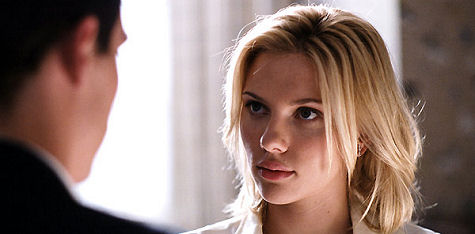
Match Point star Scarlett Johansson.
“Maybe I’m delusional but I really quite enjoyed it. I re-watched Crimes and Misde- meanors when I got home and, all right, maybe Match Point isn’t quite up to that standard, but it just might be enough to renew some interest in Allen’s films after his last five abysmal outings.
“Speaking of Paris, I also ran into Wes Anderson there a few days ago. He was sitting with a woman at a sidewalk table in front of a small cafe on Blvd St. Ger- main between Rue De Seine and Rue Danton. And I was walking along with my friend Michael.
“Unnhh…Mr. Anderson.”
“Yes.”
“I thought it was you. I’m sorry to interrupt, but my friend and I were just discuss- ing you and your films about a block away and how you were living in Paris. Then I saw you and had to say something.”
“No problem,” he said. “What’s your name?”
“I’m Grant. This is Michael.”
“Hey, Michael…I’m Wes. This is Deborah.” And we all shook hands.
Sitting on Wes’s table was a large script that had drawings in red marker along the margins, with a small notebook on top of it.
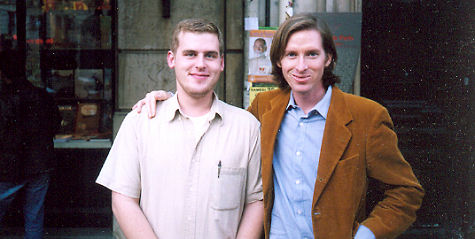
Grant Peterson (l.) and Paris resident Wes Anderson on the occasion of a chance meeting on Blvd. St. Germain — Wednesday, 10.26, 3:45 pm
“About two weeks ago I read that Noah Baumbach mentioned you were living in Paris,” I said to him, “and I’m only here for the day before I head back to the States and I was thinking it would be really awesome to run into to you…and then it happens!”
He asked if I’d seen Noah’s film, The Squid and the Whale.
“No, I haven’t. Unfortunately it’s not out in Portland where I live. I think it’s opening this week.”
Then I asked Wes if Michael could take our picture together.
“Not a problem,” he said. He stood up and gestured for us to move over to an empty space next to the cafe. Wes put his arm around me and I smiled. We shook hands again and I thanked him profusely. He said it was no trouble.” — Grant Peterson
Mondo Kongo
“When I saw Heavenly Creatures six or seven years ago it not only became my favourite Peter Jackson movie, but led to increased interest in the then-upcoming Lord of the Rings trilogy that he would be directing.
“Heavenly Creatures is still my favourite Peter Jackson movie, mainly because it’s my only favourite Peter Jackson movie. I really became pissed off with the LOTR films as they contained leading characters I hated (fucking Hobbits), multiple endings (especially Return of the King) and a director obviously going up his own rear.
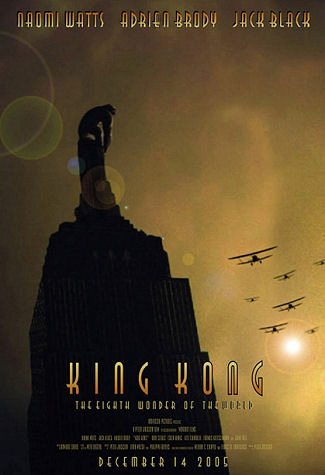
“With all the internet correspondents writing about the Rings films like they were the second coming and that we have to see them, etc. I really did not like this overwhelming favouritism as I found it really hard to judge the films on their own merits, which I managed to do when I got them on DVD. I certainly didn’t like them as much as AICN fellowship had implored me to do.
“When I heard that King Kong is going to be three hours long, all interest in this film died on the spot. You know at least an hour is going to be useless filler. What audiences want, which has been lacking from a lot of blockbusters this year, is an element that keeps them glued to the screen. Maybe King Kong will be a masterpiece…who knows?
“I’llstart taking Jackson seriously when he makes a low-budget indie film without all his usual toys. A low-budget indie film, say, about a disintegrating family, written by Harold Pinter, But right now I seriously doubt a director who is a) so obviously full of himself, and b) is being told he’s the greatest thing since sliced bread. He’s like the film world’s equivalent of Bono.” — Ben Colegate, London
“Your observation about Jackson being at a place professionally where he can throw money (and extra scenes and CG and effects) at his film just because he can is very true. But I think you missed the main point, blinded are you are by reflexive Jackson-loathing.

“The point is more about Jackson having lost his way artistically. The textbook example is John Landis. After the success of Animal House and the Blues Brothers (blecch), he makes his horror-comedy An American WereWolf in London. Funny bits, decent cast (go Griffin Dunne!)…but it was fat and digressive with pointless (for me) spooky dream sequences involving Nazi pig monsters and too many squibs and too much blood.
“It seems that when the artists are starting out and have less money, they have to be more creative, and are forced to generate more innovate material. Once they’re established…well, money can’t buy love, but it can buy a lot of CG. Many artists fall prey to the temptation to take those kinds of shortcuts, not just Jackson or Cameron.
“The question is, can Jackson rise above his demonstrated tendencies to self-indulge? I guess we’ll have a clue about this soon enough.” — Roy “Griff” Griffis
Sunday Evening

Schiller’s Liquor Bar on Rivington, a couple blocks north of Delancey on Manhattan’s Lower East Side — Sunday, 10.30.05, 8:50 pm.

Ditto, exterior — 9:15 pm
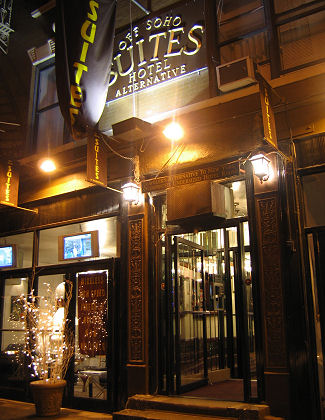
Pseudo-hip discount Manhattan hotel…”only” $169 per night.

Walking back to good old ratty Brooklyn across Williamsburg bridge — Sunday, 10.30.05, 10:05 pm

Schiller’s again














